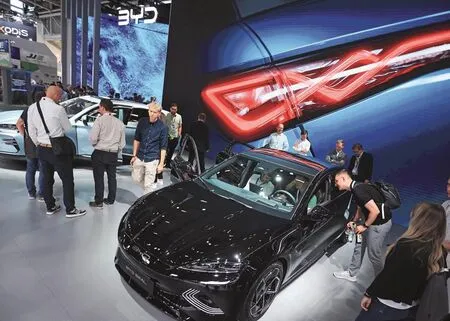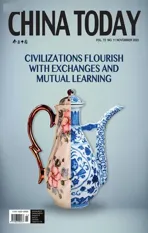Behind EU Policies on Chinese EVs
2023-11-08ByLYUYUNMOU
By LYU YUNMOU
The EV industry should be an area for mutually beneficial cooperation between China and the EU instead of being a test track for European protectionism.

Visitors inspect a BYD Seal electric sedan put on display on day two of the Munich Motor Show (IAA) in Munich, Germany, on September 6, 2023.
IN her annual speech to a full European Parliament on September 13, 2023, European Commission President Ursula von der Leyen announced that the European Union (EU) was launching an anti-subsidy investigation into electric vehicles (EVs) coming from China.“Global markets are now flooded with cheaper Chinese electric cars,and their price is kept artificially low by huge state subsidies.This is distorting our market,” she said.“Europe is open for competition, but not for a race to the bottom.We must defend ourselves against unfair practices,” she added.
This is not the first time the EU initiated antidumping and anti-subsidy investigations against Chinese products.The previous two, in 2012 and 2013, involved solar panels and telecommunications gears, respectively.But the latest one came at a sensitive timing — the term of the current European Commission will be up next year.It is unusual for its president to disclose any major action against China in the last state of the union address in her tenure.It is hence important to understand the calculations behind such a move.
Calculations
First, the EU is increasingly worried about its economy.Amid spiraling inflation, weak consumer spending, a gloomy market outlook, and slowing down credit supply, EU’s economic growth is losing steam.This lays the ground for the EU’s move against electric cars from China.In August, the Purchasing Managers’ Index (PMI) in Europe continued its seven-month fall to land at 44.7 percent, staying below 50 percent for 13 successive months, indicating continuous economic contraction.
The Summer 2023 Interim Economic Forecast released on September 11 revised growth for the EU and the euro zone from 1 percent to 0.8 percent for 2023, and from 1.7 percent to 1.4 percent for 2024.Given this, there is overwhelming anxiety across the EU, and Europeans feel that they are lagging behind other major economies.Protectionist sentiment is rising, especially when it comes to China.Economic polices featured prominently in von der Leyen’s speech on the state of the union.
The EU has been wary of China’s strength in the EV industry.Over the past year, the region saw modest recovery in its automobile sector.Sales edged up steadily, but still remained 20 percent lower than pre-pandemic levels.By contrast, China’s auto industry reported strong growth, especially in the EV sector.In the first seven months of this year, China exported 2.78 million automobiles, a steep increase of 69 percent year on year.With advanced technology and competitive prices, China-manufactured EVs are taking up a bigger share of the global market, which has compounded pressure on major European auto makers and alarmed the European Commission, the bloc’s market guard.
Second, political factors are at play.The European Commission initiates antisubsidy investigation after receiving a valid complaint from an EU business, at the request of a member state or on its own motion.In the past, the European Commission usually passively started investigation procedures upon receiving a complaint lodged by businesses.However, this time, it is proactive despite considerable controversy in the business world.The decision of initiating the investigation was announced at a time when von der Leyen and Chinese Premier Li Qiang just had a meeting and Vice President of the European Commission Valdis Dombrovskis was about to visit China for the China-EU High-Level Economic and Trade Dialogue.This timing indicates political connotations – the EU is attempting to win new bargaining chips in the upcoming talks with China.It is a shared view among European media that the latest investigation is not a conventional one, but a highly politicized move with certain political stakes.

Policy Trend
As the investigation was formally initiated, the European Commission is about to hold talks with China, and be obliged to provide evidence of government subsidies for Chinese EV manufacturers over a certain period and the injury they cause to the European industry.If the commission confirms, based on investigation, its accusation, it may impose extra tariffs on Chinese EVs.
Member states of the EU can oppose such a decision by reaching a qualified majority during a council vote.In other words, the opposing side need to represent 55 percent of EU member states, and 65 percent of the EU population.Given France, the second most populous country in the EU, supports such an investigation, it is unlikely to gather enough votes to stop new tariffs on Chinese EV manufacturers.According to European Commission rules, after a formal investigation began, provisional measures must be imposed no later than nine months, followed by four months to impose definitive measures, if legally warranted.This means the anti-subsidy probe will be the responsibility of the next European Commission.With the delay comes certain uncertainties.
It should be noted that EU members are split over the investigation, with the rift most prominent between France and Germany.Though both France’s Finance Minister Bruno Le Maire and Germany’s Federal Minister for Economic Affairs and Climate Action Robert Habeck welcomed the decision to begin the investigation following von der Leyen’s state of the union speech, the two countries have divergent interests.
Data of the China Passenger Car Association show that the share of French-made automobiles in the Chinese market had dipped to 0.4 percent as of August this year, compared with 17 percent for German cars.As Germany-based EV market analyst Matthias Schmidt observed, French auto makers are unhappy about the incursion of Chinese EVs into France’s domestic market, because “French [carmakers] are highly exposed to their own domestic market;” while their German peers are against any provocations toward China, as they place great value on the Chinese market.A researcher with S&P Global predicted that given the mutual reliance between China and Germany in their economies, protectionist acts will be self-defeating, and German auto manufacturers may take all measures possible to avoid trade barriers.
The EU has indeed ratcheted up support for this sector, by implementing the European Chips Act,Critical Raw Materials Act, and Net-Zero Industry Act among other supportive policies.Gabriel Felbermayr, director of the Austrian Institute of Economic Research, pointed out the similarities between the supportive policies for industries between China and Europe.If the EU claims Chinese subsidies breach WTO rules, it is being someone who lives in a glass house throws stones, he said.
Cooperation
The EV industry should be an area for mutually beneficial cooperation between China and the EU instead of being a test track for European protectionism.
The long industrial chain and high level of globalization in the auto industry have shaped the close interconnection and interdependence between China and Europe.The European Commission said China’s share of EVs sold in Europe had risen to 8 percent and could reach 15 percent in 2025.On this trajectory, EVs could become a pillar of China-EU trade in the years to come.Decoupling is in itself the biggest risk, and can only be averted by building closer economic ties.
Chinese imports can help improve the EV supply structure in the European market, where entry-level models are scant.With technological strength and competitive prices, Chinese EVs add diversity to the European market and provide more options to European consumers.They are, therefore, a real boon to both individual car buyers and the EU’s green transition drive.
China is also a market that Europe cannot take lightly.It is the largest foreign market for many European car makers and a hot destination of their investments, receiving record sums over the past years.According to theFinancial Times, the combined share of foreign auto makers, led by those from Germany, Japan, and the U.S., stands at half of the Chinese market.And European direct investment in China’s auto industry hit a record high of 6.2 billion euros in 2022, according to Rhodium, a U.S.research group.
Competitiveness is gained through competition rather than isolation or protectionism.All that can be expected from the EU’s anti-subsidy probe is heightened risks for China-Europe trade and disruptions in international economic order, which is harmful for all parties involved.
